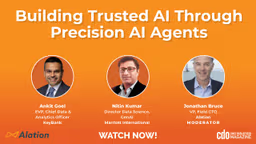Leadership
Critical Learnings from Munich Re Data and AI Chief’s Setbacks
Written by: CDO Magazine Bureau
Updated 12:54 PM UTC, Mon February 24, 2025
In this second part of the interview Fabian Winter, Group Chief Data and AI Officer at Munich Re, discusses key lessons learned from failed data and AI initiatives. Speaking with Julian Schirmer, Co-founder of OAO, Winter reflects on the challenges of building a data-driven organization, the importance of setting realistic expectations for AI, and the value of upskilling internal talent.
Winter elaborates on why democratizing data requires more than just access, how companies can identify meaningful AI use cases, and why upcoming data leaders must focus on business impact beyond technical excellence.
The first part of the interview explored how AI is reshaping reinsurance, from leveraging unstructured data to enhancing underwriting and risk evaluation. Winter also discussed the challenges of integrating AI while maintaining human expertise. Watch it here.
Edited Excerpts
Q
We don’t often talk about failures. Is there a specific failure you’d be willing to share and how it has influenced what you do differently today within Munich Re?
A
When we implemented our data lake, we firmly believed that significant democratization would encourage people to share data, build data products, and take on roles as data stewards — essentially fostering a self-sustaining data economy.
That, however, didn’t turn out to be true. If you want to develop global data products, you need dedicated teams, experts, and even people who can market them. We realized that our initial approach was flawed and we’ve since learned from it and made necessary changes.
Another major learning for me comes from my time at Munich Re when I joined in 2009. We started with predictive modeling, and then, seemingly overnight, trends like big data, artificial intelligence, and data science were predicted to cause rapid disruption. That didn’t happen as quickly as people expected.
The impact and speed of change of these technologies tend to be overestimated initially and underestimated in the long run. One of the key learnings from the past 15 years is to stay as close to the real adoption curve as possible — avoiding exaggerated expectations while ensuring preparedness.
A great example of this is GenAI. When GPT-3.5 was released, there was widespread talk about how it would change everything within three months. Those who understood transformer models and their limitations knew that such rapid transformation wasn’t realistic.
Yet, as the Chief Data and AI Officer, I often found myself in the unusual position of managing expectations downward — telling colleagues to take a measured approach, find the right use cases, and avoid wasting money on hype. Now, interestingly, some of the same consultants who previously claimed GenAI would change the world overnight are saying it was overhyped and didn’t deliver on its promises.
Having a clear grasp of the technology’s capabilities and its limitations greatly increases the chances of executing economically meaningful use cases. This is not just about avoiding wasted investments; it’s also about maintaining internal buy-in. If people repeatedly experiment with new technologies and see little success, it becomes increasingly difficult to convince them to try again.
Q
Is there something you’ve tried that worked well for your team, and that you believe others should consider adopting as a best practice?
A
Although our approach to establishing a data economy did not work out, what’s been more successful is our focus on education, as we aimed to decentralize analytics knowledge throughout the organization.
We’re an expert-driven company, so it’s always been a challenge to combine the subject matter expertise of engineers or physicians with data science skills. To address this, we launched a data analytics academy in 2016 for employees at various levels and with different profiles.
The offerings range from short e-learning sessions that introduce all employees to analytics, to more targeted programs for managers, client managers, and business analysts. We also provide advanced training for our natural science professionals, including actuaries and mathematicians, collaborating with universities to upskill them.
This initiative has had a significant impact with data analytics capabilities now embedded throughout the organization. There’s not a single office at Munich Re where at least one person hasn’t completed our “black belt” training, which covers sophisticated analytics and, more recently, AI and NLP.
Is this approach transferable to others? It depends. The key factors are how decisions are made (centrally or decentrally) and how knowledge is distributed. For us, investing in our own people and not relying too heavily on hiring from outside our industry has been effective.
Q
From your journey as a Group CDAIO, is there a key learning or message you’d like to share with those aspiring to take on roles in the data and AI field?
A
It depends on the direction you want your career to take. If you’re stepping into a role outside academia, especially in the business world, one of the key things to remember is that you can’t just focus on the academic side of things.
Often, younger data scientists are excited by everything they’ve learned at university. The mathematical foundation is crucial and understanding math and technology is essential. But if you want to succeed in business, you need more than just technical knowledge.
It’s not enough to just think about how good your model is. Ultimately, you need to ask, “How do I earn money with that?” I see this a lot with our junior people; sometimes they stop at the point where they’ve found the best fit for their model with the existing data and think the job is done.
To build a career in business, it’s about creating real-world impact. It’s also about being able to communicate that impact clearly to people who may not have the same academic background.
CDO Magazine appreciates Fabian Winter for sharing his insights with our global community.






